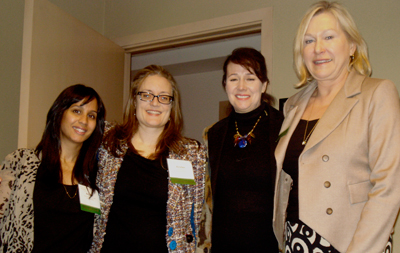Women In Business: The Challenges Remain
By Tara Macaulay
Just how egalitarian is the workplace?
YWCA Welcomes Female Leaders
It was a question brought before an audience of HR professionals on February 26, 2013 at the YWCA Metro Vancouver at a special panel discussion arranged by the BC Human Resources Management. “Innovative Workplaces: Supporting Women in Business” was a sold out event, drawing a largely female audience out to listen to a discussion which indicated that though progress has been made—there is much work to be done.

(left to right) Anjana Moitra-Ohri, Kirsten Sutton, Janet Austin, Evi Mustel
Moderated by Anjana Moitra, owner of Mori Consulting, the panel featured three undeniably strong female leaders for whom supporting other women in business is a natural best practice: Janet Austin, CEO, YWCA Metro Vancouver; Kirsten Sutton, managing director, SAP Labs Canada, and Evi Mustel, owner, Mustel Group.
Unfortunately, all acknowledge this does not hold true unilaterally.
Society’s Paradoxical Support
Much depends upon the business and the individual. That should not deter women from moving further forward regardless of present employer. “If the resources aren’t available to you internally, look outside your organization,” says Austin.
“The opportunities the employer offers and the woman herself are key,” says SAP’s Sutton, who recognizes a lot can depend on the industry as well. “Be purposeful. Ask yourself, what’s important to you now and where do you want to go. Then find the people who can help you get there.”
“The most common barrier women face today is partly personal, partly cultural,” says YWCA’s Austin. “But the signal biggest, most important factor limiting women’s ability to participate fully is societal.”
Whether or not women are willing and able to both hold a seat of executive power and raise a family is still considered a topic of conversation for many. While societally it is agreed that it is vital and beneficial for companies to support a diverse workforce, such is not always the case at street level. Many companies do not fully encourage women, nor do they foster structures that recognize the demands of career, family, community and personal growth. For many women, the sense of isolation remains.
Isolation and Wage Gaps Remain
Austin knew that feeling well—once upon a time. “It wasn’t uncommon to be the only woman executive in a room with eight to 10 men,” she says, noting that isolation is financial as well. “The trend for women to move into upper management roles is increasing, but there’s still an enormous gender earnings gap of 28 per cent.”
Mustel acknowledges that giving up ‘climbing the corporate ladder’ is one way women attempt to create balance, but independence can only make things more challenging. “If you own even more than 40 per cent of a business, there is no such thing as maternity leave,” says Mustel.
One Wish? Universal Childcare
No fewer challenges await women who are returning to the workforce from maternity leave only to find they are faced with insufficient and/or unaffordable childcare. According to the panelists, while a rarely recognized burden, it is one which, if lifted, would make for a world of difference for women returning to work.
“If we could do one thing to better a lot of things, it would be to provide universal access to affordable quality child care, but governments have a hard time making these decisions.” says Austin. She adds that the benefits of such a program to the economy are already well established. “What I’d like to see is a change in public policy. Incentives for men to take a stronger role in parental leave.”
Sharing a Better Vision
“As women we need to educate ourselves around these issues, share our beliefs and make it okay for government to take visionary risks,” Austin adds.
Above all, women need to take the lead in changing our society’s beliefs surrounding these issues. We need to stop feeling guilty entirely, start getting assertive—and get a whole lot more involved in leadership.
Tara Macaulay received her BA from the University of South Florida in Mass Communications/Journalism where she was a correspondent for the student paper. She is a member of BC HRMA and is excited to be taking part in the mentoring program.








